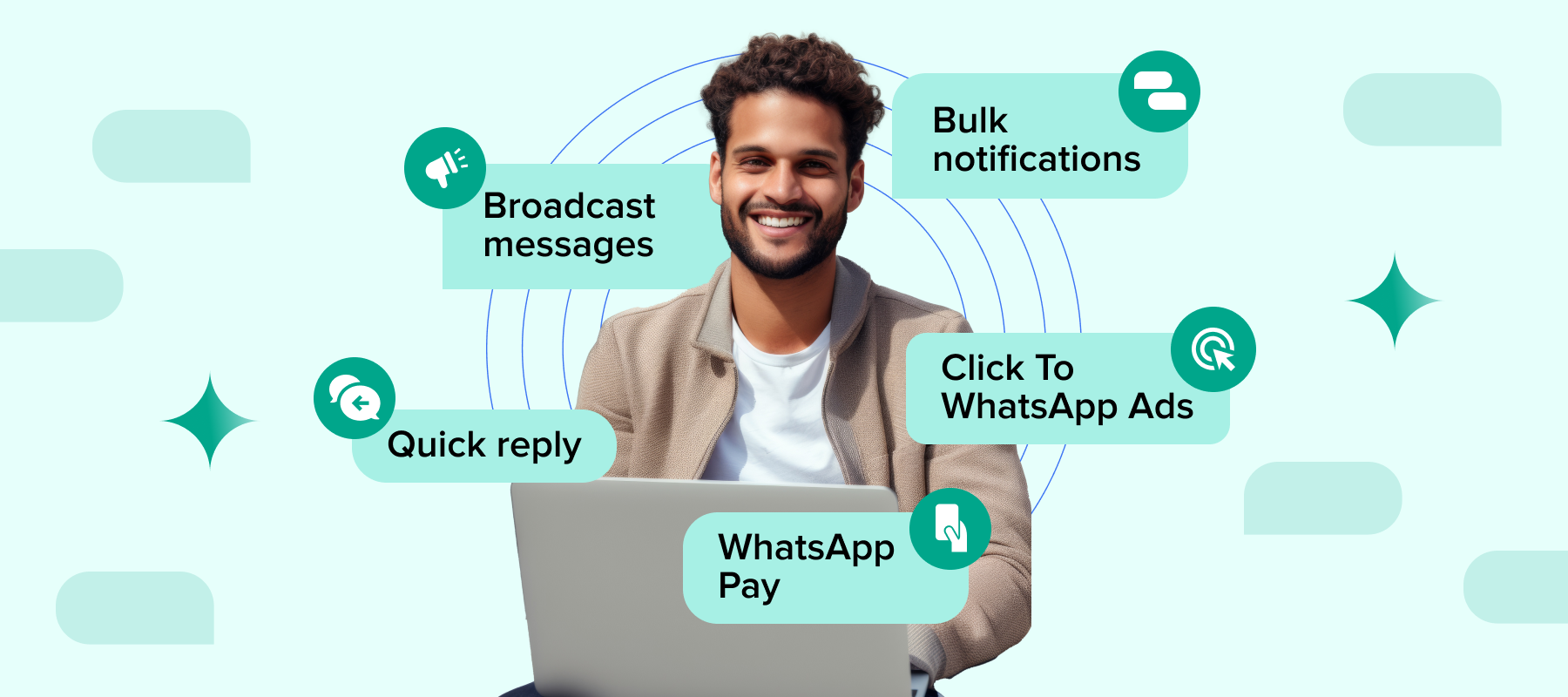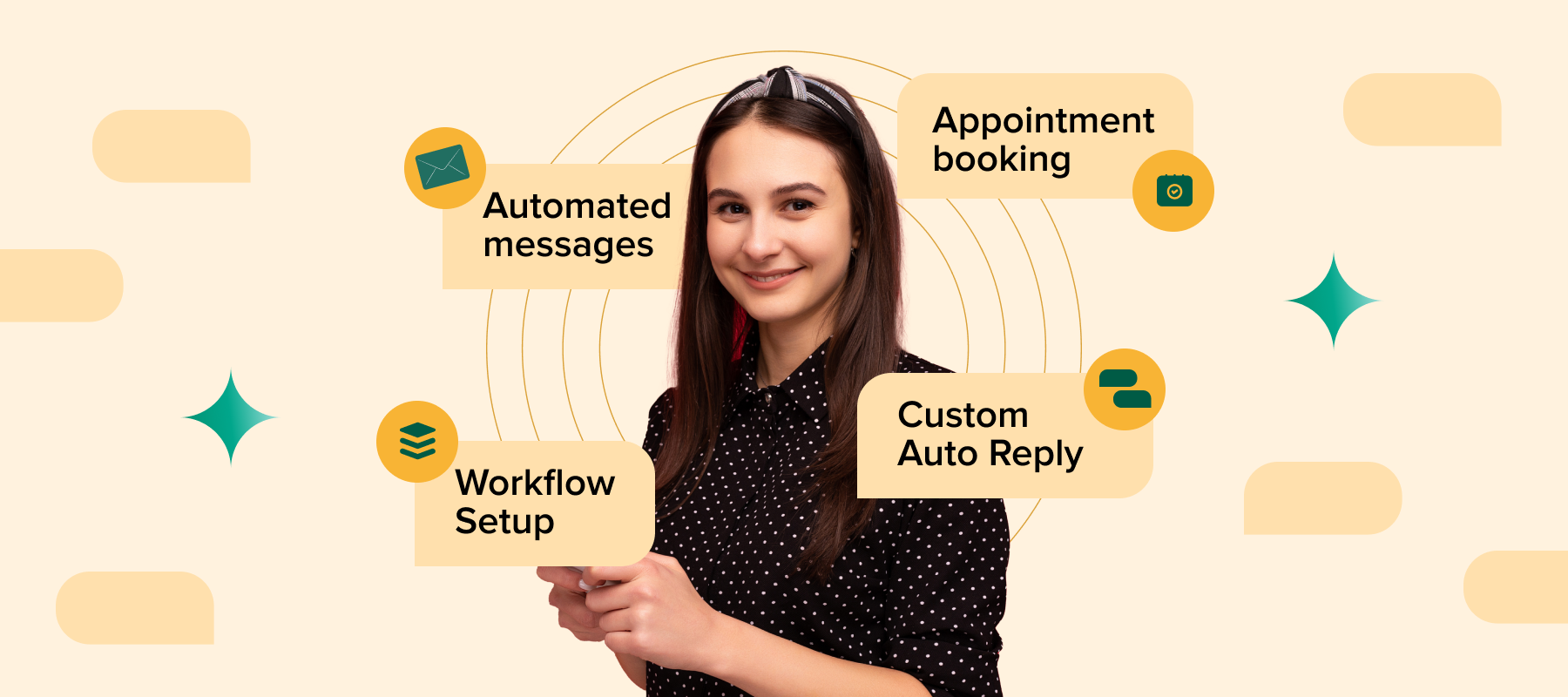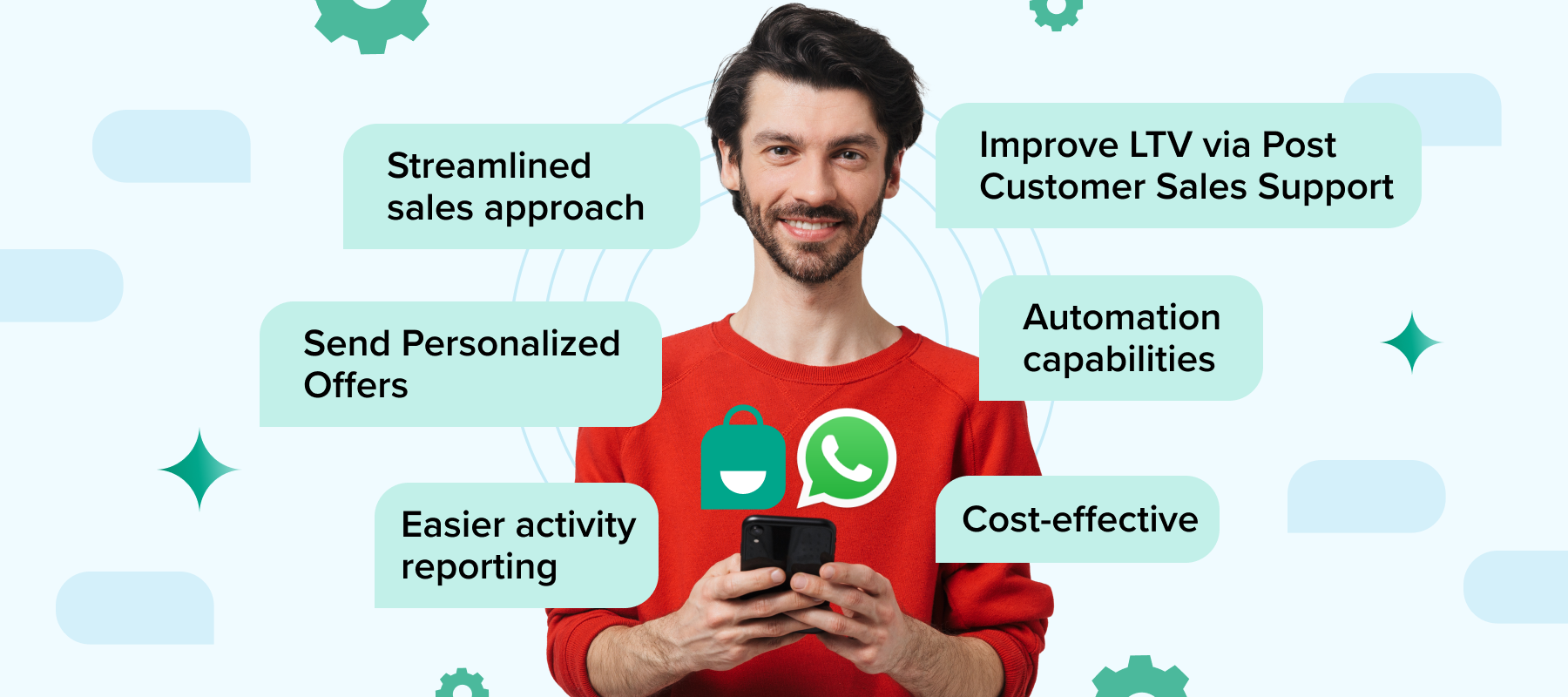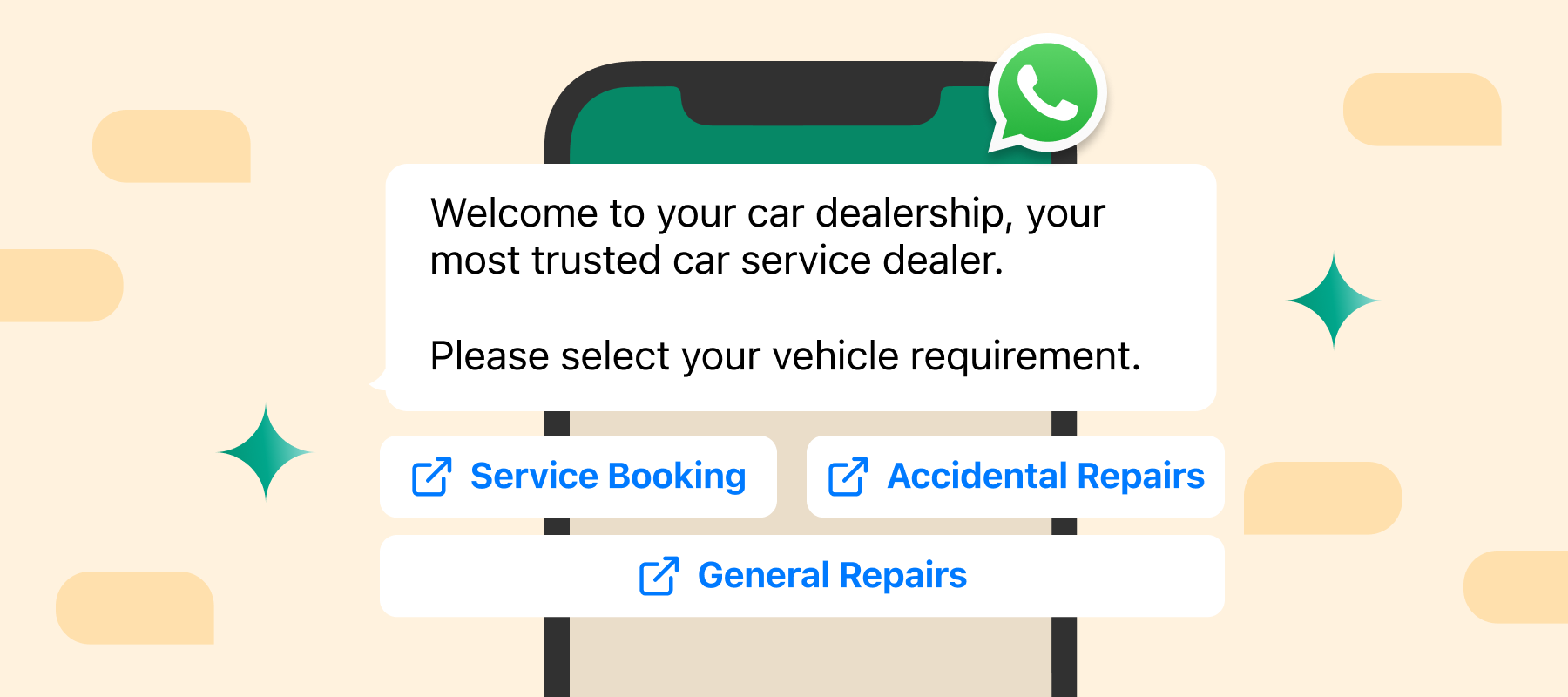Marketing has become increasingly tricky as most channels and platforms have become noisy and overwhelming. Businesses are seeing decreased open rates on campaigns and even lower engagement despite the best of automation and personalization. But amidst the struggle, a lot of brands have discovered the opportunities that WhatsApp brings to them.
By offering brands a more direct channel to reach and engage their customers on a platform where they’re already active, WhatsApp marketing is making waves today.
With this master guide, we aim to share everything you need to know about WhatsApp marketing and how to get started.
What is WhatsApp marketing?
With WhatsApp marketing brands can connect directly with customers through bulk promotions, customer support on WhatsApp, and live updates. As a highly popular and conversational platform, benefits of direct customer engagement, higher open rates, personalized messaging, and seamless communication, make WhatsApp a powerful marketing tool for businesses. Some features of WhatsApp marketing tools include the ability to automate messages, provide customer support, send dynamic interactive messages, and more, creating more engaging communication.
Top 4 Reasons You Need WhatsApp Marketing
WhatsApp marketing solutions offers several benefits over other channels and platforms. Some of them are:
1. High engagement
The engagement rate of other channels pales in comparison to that of WhatsApp, making it a highly effective channel to reach, engage, and convert customers. WhatsApp Business features like interactive messages, broadcasts, quick reply buttons, etc., enable businesses to make conversations more interactive and engaging.
2. High open rate
WhatsApp has an average open rate of 98%, significantly higher than the average open rates of channels like SMS (19%) and email (20%). This means most WhatsApp marketing messages you send have a better chance of being opened and interacted with. Additionally, the average response time for WhatsApp messages is 90 seconds, indicating that most customers will not only open your messages but do so quickly.
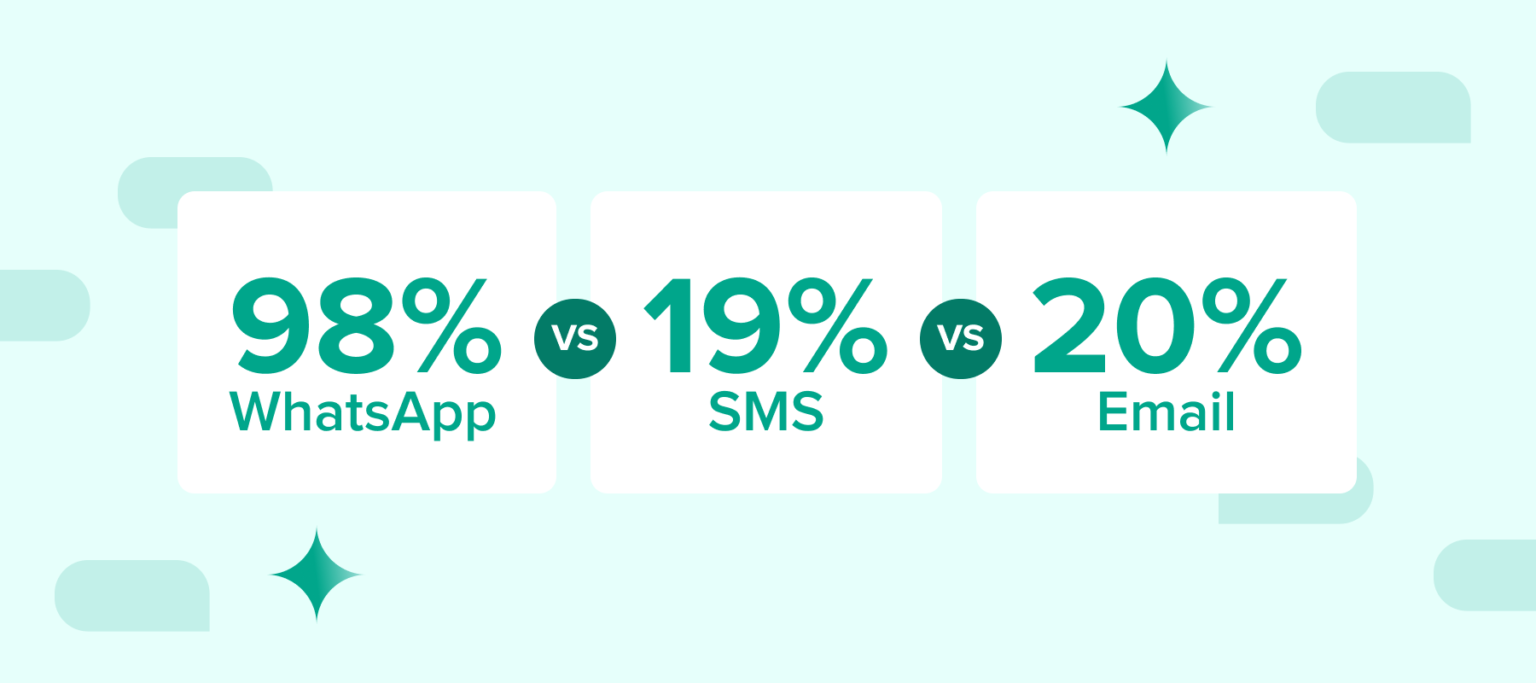
3. Rich media
WhatsApp marketing offers the added benefit of allowing you to share media content. You can enhance the communication experience and carry out impactful marketing using rich images, videos, audio, voice notes, PDF documents, and more.
4. Cost-effectiveness
WhatsApp marketing is known for its profitable cost-to-return ratio, making it ideal for both small, growing businesses and large enterprises. The WhatsApp Business app is free to use, and even with the WhatsApp Business API paired with a solution provider like Interakt, the costs are negligible compared to the benefits and ROI it can deliver.
4 Proven Benefits of WhatsApp Marketing to Boost Sales
The primary objective for marketers are solving with WhatsApp include:
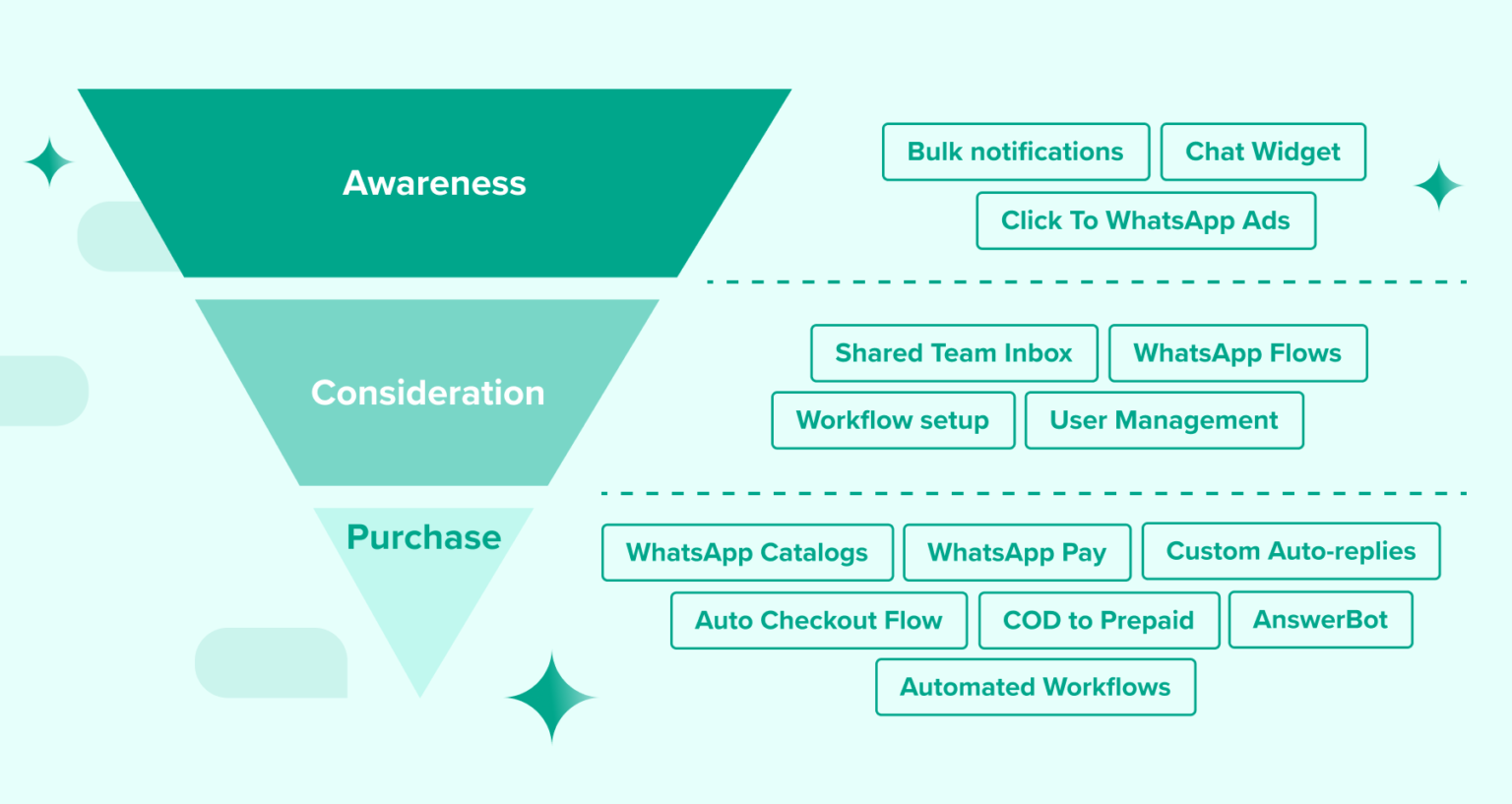
1. Awareness
At the awareness stage, you can intrigue and engage customers by sharing information about your product directly with your opt-ins or by running click-to-WhatsApp advertising that lead customers to your chat. WhatsApp marketing can effectively make customers aware of your product, its features, and benefits from the outset.
2. Consideration
After capturing the customer’s attention, you can further nurture their interest and encourage them towards a desired action, such as a purchase or subscription, through WhatsApp. WhatsApp marketing automation can be used to answer questions at the consideration stage, or live agents can provide personalized, hands-on lead nurturing.
3. Purchase
With clever and engaging WhatsApp marketing messages, you can guide customers to the desired point of sale and allow them to place orders seamlessly through WhatsApp. Being a familiar, accessible, and user-friendly platform, WhatsApp can significantly simplify the purchasing process for customers.
4. Post-purchase
Your WhatsApp business marketing efforts can extend beyond the purchase to further engage customers, build long-term relationships, and drive repeat sales. You can use first-party messaging data to personalize offers, request feedback and reviews, answer questions, and more. Personalized messaging helps build customer trust and provides a consistently comfortable and satisfactory experience.
WhatsApp Marketing Messages [EXPLAINED]
WhatsApp marketing messages are a powerful tool for businesses to engage with customers directly through the WhatsApp platform. With over 2 billion active users, WhatsApp offers a personal and efficient way for SMBs & enterprise businesses to reach out to their audience, deliver updates, promotions, and provide customer support in real-time. For businesses, leveraging WhatsApp for marketing can build stronger customer relationships, drive sales, and improve brand loyalty by offering convenience and immediacy.
Steps to Create and Send WhatsApp Marketing Messages
Step 1: Set Up WhatsApp Business Account
– Download WhatsApp Business app and complete your profile (business name, address, website, and description).
– Use WhatsApp Business API for larger-scale operations or integration with CRM tools.
Step 2: Build a Contact List
– Ensure that your contacts have opted-in to receive marketing messages.
– Organize contacts into different groups based on interest, behavior, or demographics.
Step 3: Craft Your Marketing Message
– Keep it short and engaging: Customers prefer concise, clear messages.
– Personalize: Use the recipient’s name or preferences to make the message feel personal.
– Include a clear call to action (CTA): Tell them what you want them to do next (e.g., “Shop Now” or “Get 20% Off”).
– Use media: Images, videos, or product catalogs can make your message stand out.
Step 4: Choose the way to send messages
– Broadcast Lists: Send the same message to multiple contacts without them knowing who else received it.
– Groups: Useful for sending messages to specific segments of your audience.
– Direct Messages: For one-on-one conversations or personalized responses.
Step 5: Send the Message
– Use WhatsApp Business app or the WhatsApp Business API to send the message.
– Ensure that the content complies with WhatsApp’s business policies to avoid being flagged as spam.
Step 6: Monitor and Respond
– Track message delivery, open rates, and responses.
– Engage with customers promptly by answering queries and offering additional support.
By following these steps, SMBs can leverage WhatsApp marketing messages effectively to build relationships, increase engagement, and drive business growth.
Ways To Use WhatsApp Marketing Messages
For SMBs, WhatsApp marketing messages offer several benefits:
1. Direct Engagement: Reach customers where they are most active.
2. Cost-Effective: WhatsApp offers low-cost messaging compared to traditional marketing channels.
3. Personalization: Send targeted and personalized messages that improve customer satisfaction.
4. Instant Communication: Respond to inquiries quickly, enhancing the customer experience.
5. High Engagement Rate: WhatsApp messages have a significantly higher open and response rate compared to email and SMS.
FREE WhatsApp Marketing Strategy & Bonanza To Boost Your Sales
WhatsApp has become a game-changer for businesses, offering direct and instant communication with customers. Here’s a free and comprehensive strategy to help you get started with WhatsApp marketing and boost your sales:
1. Download WhatsApp Business App
– Start by downloading the WhatsApp Business App to get access to business-specific features. This app allows you to create a professional presence, offer customer support, and send marketing messages directly to your customers.
2. Personalize WhatsApp Messages
– Personalization is key to engaging your audience. Address your customers by their names and send tailored messages based on their purchase history or preferences. Personalized messages have higher open rates and drive better engagement.
3. Create WhatsApp Business Profile
– Set up your Business Profile on WhatsApp with key information such as your business name, address, contact details, and website. A well-crafted profile builds trust and credibility with your customers.
4. Create Broadcast Lists
– Use Broadcast Lists to send messages to multiple customers at once without them knowing who else received it. This ensures privacy while allowing you to reach many people at once. Segment your lists by interests or demographics for more targeted outreach.
5. Craft a Product Catalog
– Use the Product Catalog feature to showcase your products and services directly on WhatsApp. This makes it easy for customers to browse and inquire about your offerings right from the chat.
6. Broadcast Promotional Messages on WhatsApp
– Broadcast special offers, product launches, or sales to your customers via WhatsApp. Ensure your messages are relevant, concise, and provide clear calls-to-action (CTAs).
7. Implement WhatsApp Chatbot
– Use a WhatsApp Chatbot to automate common tasks such as answering frequently asked questions, booking appointments, and even processing orders. Chatbots can provide instant responses, improving customer satisfaction.
8. Monitor Conversion Rate
– Track the Conversion Rate of your WhatsApp marketing campaigns. Focus on metrics like responses, purchases, and inquiries to measure how well your campaigns are driving sales.
9. CTWA (Click-to-WhatsApp Ads)
– Leverage Click-to-WhatsApp Ads on Facebook and Instagram to drive traffic directly to your WhatsApp. This allows customers to engage with your business immediately by clicking on your ad.
10. SmartAds [Bonanza]
– Use SmartAds to run targeted advertising campaigns on social media that direct users to your WhatsApp. With this feature, you can optimize your ads for conversions and better engage your audience.
11. WhatsApp Flows [Bonanza]
– Create WhatsApp Flows (automated message sequences) to guide customers through a journey, whether it’s a sales funnel or customer support process. WhatsApp flows can provide helpful information, offers, and follow-ups.
12. WhatsApp Catalogs [Bonanza]
– In addition to the basic catalog, optimize WhatsApp Catalogs with product details like pricing, descriptions, and images. This makes it easy for customers to browse and make informed purchasing decisions.
13. WhatsApp Pay
– Create Challenges and Quizzes to engage your audience in a fun and interactive way. Use WhatsApp to send personalized quiz results or encourage participation in contests. This can boost interaction and increase your visibility.
14. Challenges and Quizzes
– WhatsApp Pay allows businesses to send invoices and receive payments directly within the app. Implement this feature to streamline the checkout process and make it more convenient for customers to complete transactions.
15. Carousel Messages [Bonanza]
– Carousel Messages allow you to send multiple images or videos in a single message, allowing you to showcase multiple products or features. This is a great way to highlight new arrivals, offers, or promotions.
Most Used WhatsApp Marketing Message Examples [2025]
WhatsApp conversations can fall under different categories, but each requires a customer to opt-in to be able to receive messages. Here’s a list of all the types of WhatsApp conversation messages:
1. Service conversations
These are conversations related to customer service or support, which can include responses to customer queries, sharing solutions to issues, and chatbot conversations that handle simpler queries. Here’s a WhatsApp marketing message template for service conversation message:
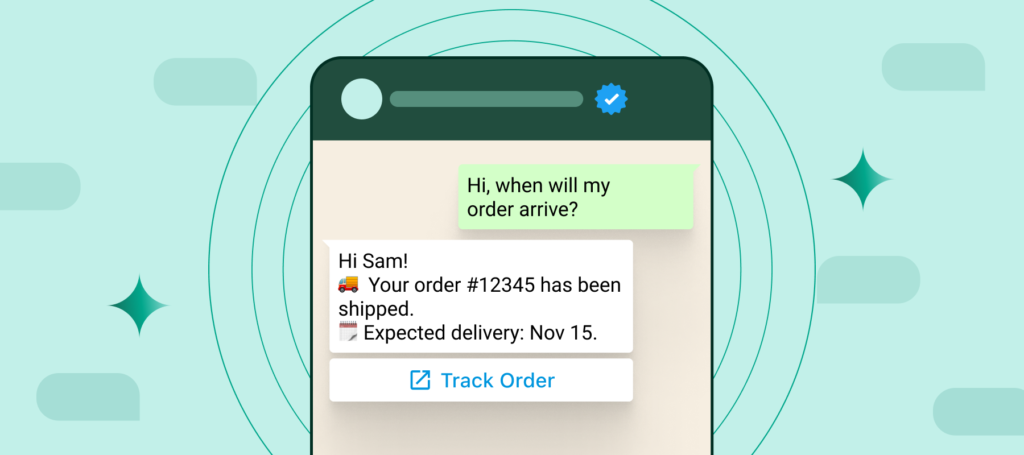
Hey [NAME],
Your order #12345 has been shipped.
Expected Delivery: Nov 15
2. Utility conversations
Utility conversations range from transactional messages, process-specific requests, order updates, post-purchase notifications, invoices, delivery status updates, order confirmations etc. Here’s a WhatsApp marketing message template for utility conversation message:
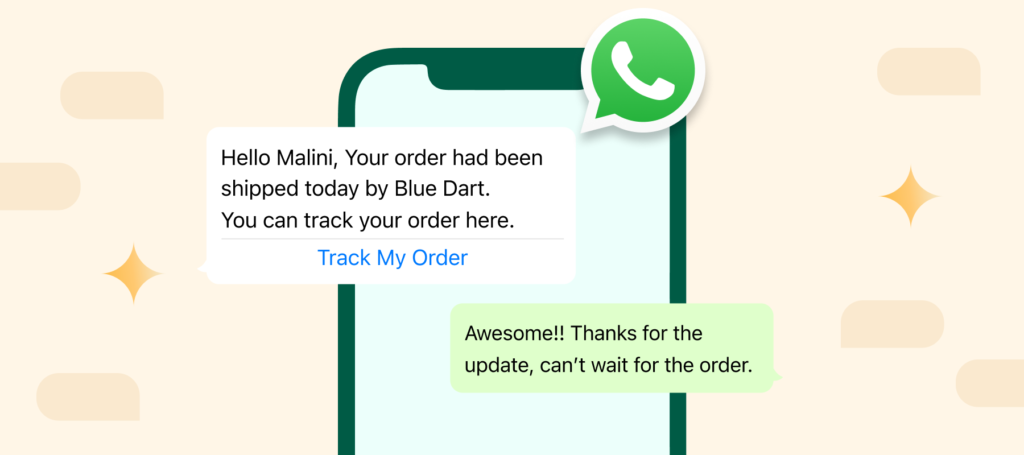
Hey [NAME],
Your order had been shipped today by Blue Dart.
You can track your order here.
3. Authentication conversations
These are conversations that are carried out to authenticate or verify the user with one-time codes or one-time passwords. These messages are common during multi-step account login processes, account verification, recovery etc. Often authentication message templates are regulated strictly and should be only used when required. Here’s a WhatsApp marketing message template for authentication conversation:
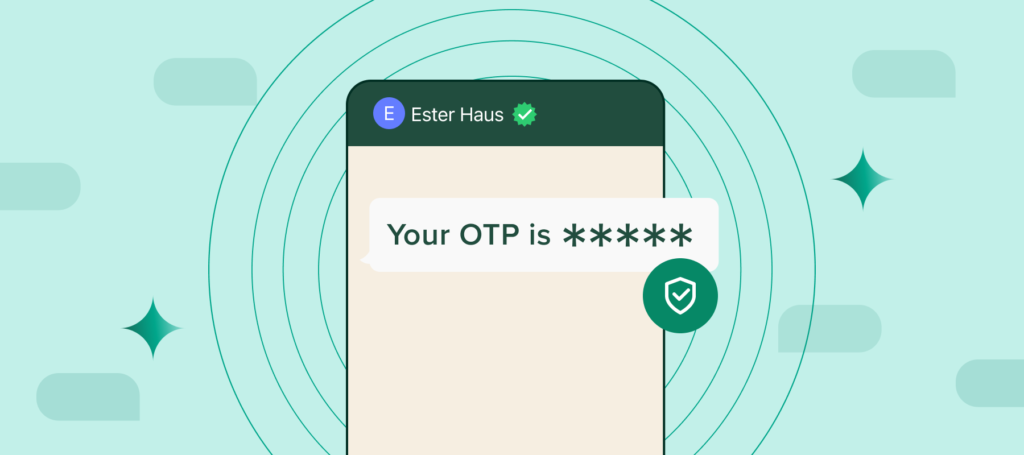
Hey [NAME],
Your One-Time Password for account verification is [CODE]!
4. Marketing conversations
Marketing conversations on WhatsApp are communications that involve sharing WhatsApp promotion message and offers, providing customers with information regarding the product or providing attractive CTAs. This category of messages can be very flexible. Note that utility conversations with marketing content will be considered as conversations falling under the marketing category. Here’s a WhatsApp marketing message template for marketing conversation:
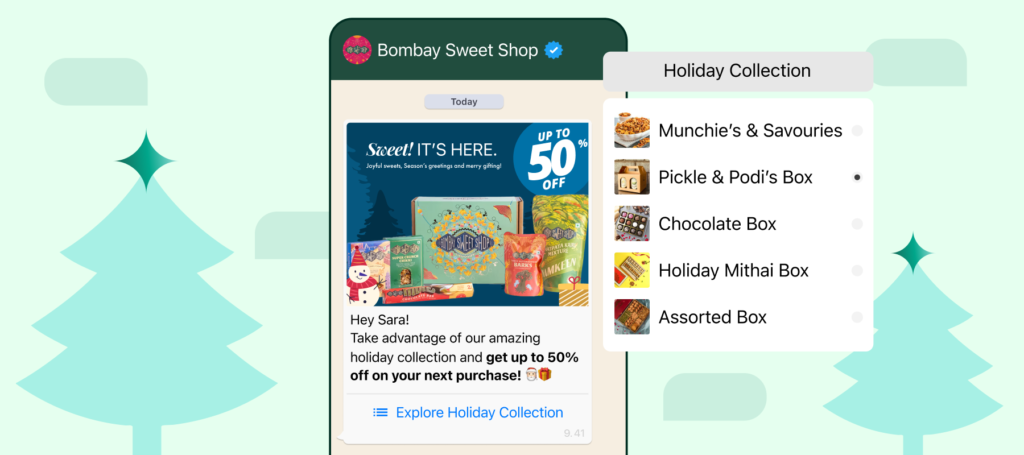
Hey [NAME],
Here is a Welcome present!
Get a special discount of 20% on your first purchase from [BRAND NAME]!
Best WhatsApp Marketing Software in 2025
As WhatsApp continues to be a top platform for customer engagement, businesses need robust software solutions to manage their marketing campaigns effectively. Here’s a list of the best WhatsApp marketing software in 2025, helping you optimize your outreach, automate communication, and boost sales:
1. Interakt
Best for SMBs looking for CRM integration and automation.
Features:
– WhatsApp Business API integration.
– Customer segmentation and personalized messaging.
– Omnichannel Inbox
– Automated workflows and follow-ups.
– Integration with CRM systems like Zoho, HubSpot, and Salesforce.
– Analytics and reporting to track engagement and performance.
Why it’s great: Interakt allows businesses to manage customer relationships and marketing campaigns efficiently. It’s particularly suited for SMBs looking to scale with seamless integrations.
2. Zoko
Features:
– Automated WhatsApp marketing with bulk messages.
– Integration with e-commerce platforms like Shopify and WooCommerce.
– Customer segmentation for targeted campaigns.
– WhatsApp Catalogs for showcasing products.
– Multi-agent support and team collaboration.
– Why Zoko: Zoko is a powerful solution for businesses running e-commerce operations and needing seamless WhatsApp integration with their sales process.
3. 360dialog
Features:
– Direct WhatsApp API access for large-scale messaging.
– Real-time customer support via WhatsApp.
– Automated workflows and message sequences.
– Multi-channel marketing support.
– Integration with CRM and marketing tools.
Why 360dialog: 360dialog offers flexible pricing, making it a great option for businesses of all sizes. It also allows easy integration with WhatsApp’s official API, enabling advanced automation and customer support.
Top WhatsApp Marketing Campaigns [2025]
Here’s how real-life brands are using WhatsApp marketing campaigns:
• Okhai
With the goal of supporting artisanal heritage, bridging traditional art with contemporary designs and providing artisans with sustainable livelihoods, Okhai began bringing the artisanal industry into the eCommerce world in 2015. Since then, with Interakt and the WhatsApp Business platform, the brand has been able to carry out seamless two-way communication with customers.
From streamlining business communication with the WhatsApp Business API to sharing targeted messages, the brand has been able to greatly enhance its marketing communication. Okhai has been able to see a 15% increase in sales since it started its WhatsApp marketing journey with Interakt.
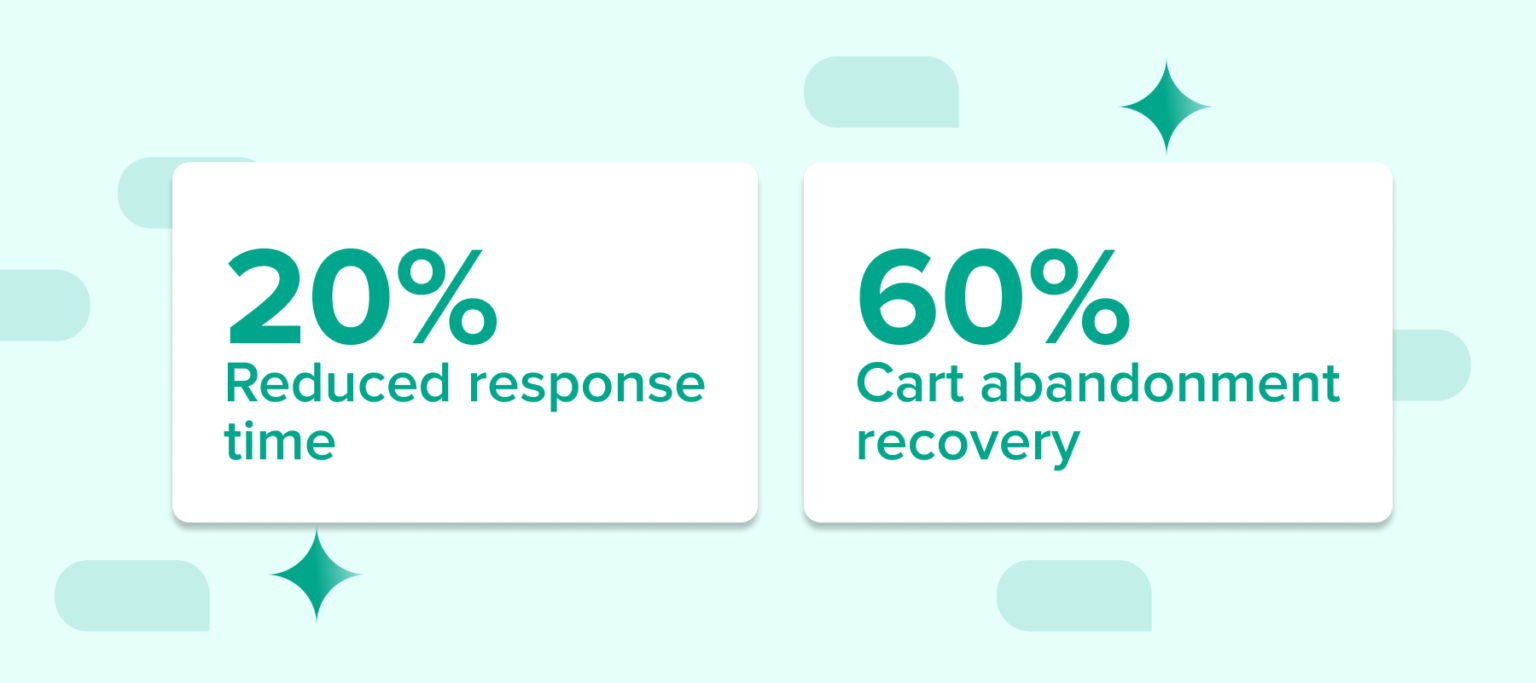
• YourStory
YourStory is a media platform that was born out of the idea of nurturing and empowering entrepreneurs while fostering a positive ecosystem for startups. Communication was key to the brand primarily to organize and promote meetings and events and ensure a good turnout.
With Interakt-enabled WhatsApp marketing, the company was sharing timely updates and invitations with higher open rates. The company was seeing conversion rates of 60-65% and delivery rates of 95%, thus improving attendee turnouts significantly.
WhatsApp marketing strategies you need in 2025
We’ve explored the effectiveness and key benefits of WhatsApp marketing. Now, let’s look at the top WhatsApp marketing strategy you can use to achieve the best results:
1. CTWA
You can run Click-to-WhatsApp ads (CTWAs) from Facebook or Instagram direct to customers with your WhatsApp, improving lead generation without the hefty cost. Customers can instantly start a conversation, making it a seamless way for interested customers to reach you and learn more about your product or service. This way, you also immediately obtain the name and mobile number of your customers for further lead nurturing.
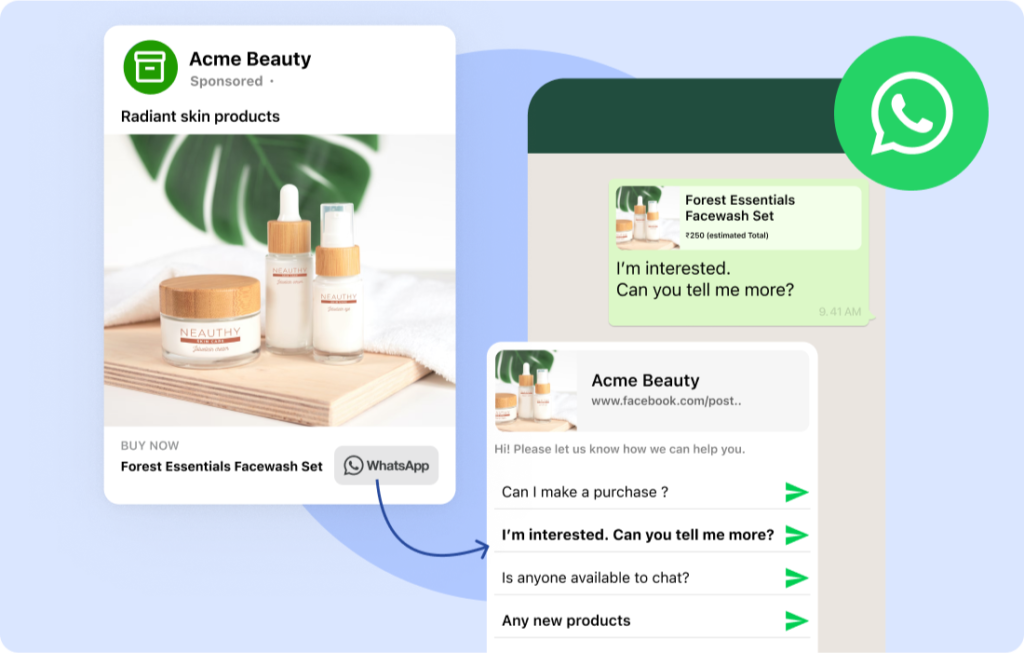
2. SmartAds
Using WhatsApp business solutions like Interakt, you can run WhatsApp smart ads. By simply providing your product URL, you can allow the AI to generate highly effective ads that help generate quality leads and grow your sales.
3. Automated notifications and reminders
Set up automated notifications on WhatsApp to alert customers about shipping, order confirmation, delivery, cart abandonment and more. Using tools like Interakt can make this possible with relative ease. These messages help keep the customer always informed and alerted, thus contributing to a stronger customer relationship.
4. Broadcast messages
You can set up WhatsApp flows, which are secondary interfaces within the WhatsApp chat from which you can collect customer responses. You can build WhatsApp flows for various purposes, such as generating leads, providing product recommendations, collecting feedback, registering for events, and more.
5. WhatsApp flows
WhatsApp Flows makes it easy for your customers to get things done within WhatsApp. Pairing Flows with your WhatsApp marketing campaigns can improve customer satisfaction by providing richer experiences, which can boost conversions and improve results.
6. WhatsApp catalogs
WhatsApp catalogs let businesses create and send product/service catalogs to customers through WhatsApp. This enables customers to easily browse your offerings, know more about products and find the right one without a hassle. The WhatsApp catalog feature can significantly enhance the WhatsApp shopping experience for customers.
7. WhatsApp Pay
WhatsApp Pay feature allows customers to easily complete a purchase from WhatsApp itself, without having to be redirected to a separate page for payment. Using UPI or net banking, WhatsApp pay enables customers to pay for their purchases from the platform itself, making the overall experience, not just convenient, but also quick and simple.
8. Personalized messages
You can share personalized messages through WhatsApp and make messages more engaging by sending message notification with rich media files like videos, GIFs, images and more. You can use WhatsApp for business for customer names and data from past interactions to make the communication more relevant and engaging to customers.
9. Quick reply and CTA
Add clickable WhatsApp buttons like CTAs or Quick replies, by utilizing the WhatsApp Business API. Call-to-action buttons can help to get users to take a desirable action such as making a purchase or signing up, while Quick reply buttons allow customers to reply to you by simply clicking on a button rather than typing.
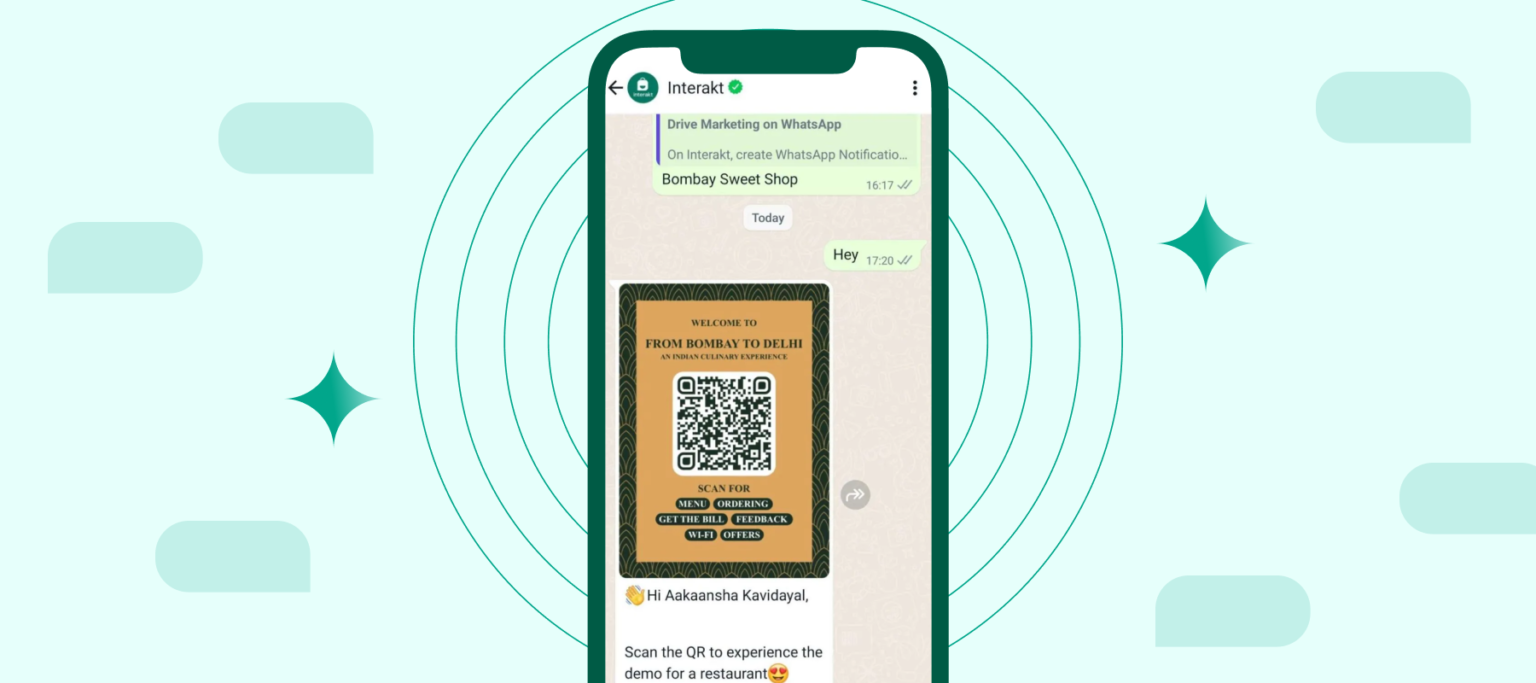
10. WhatsApp automation
By integrating a WhatsApp automation you can keep your business active around the clock. Automation on WhatsApp can handle frequently asked queries and provide instant responses to customers, share personalized recommendations, nurture leads, collect lead data and more.
11. WhatsApp button
Integrate a WhatsApp button on your store website to improve conversion, as this can be more effective, compared to a simple landing page. These buttons, when clicked, will send the user to your WhatsApp, from where you can engage them, answer any queries and convert them effectively.
12. Share WhatsApp links
Another great WhatsApp marketing strategy is to create WhatsApp links and share them across different channels to direct customers towards your WhatsApp Business. WhatsApp links can be shared anywhere and everywhere and by turning it into a QR code you can boost traffic by sharing it across diverse social media platforms or even in pamphlets and posters.
13. WhatsApp loyalty programs
Loyalty programs incentivize loyalty, and having a WhatsApp loyalty program is a great marketing strategy to build long-term customer relationships through WhatsApp. This will not only make the regular customers feel appreciated but also attract new customers to your business.
14. Challenges and Quizzes
Customers appreciate engaging and fun challenges or quizzes, which can be one of the many effective WhatsApp marketing strategies to keep the customer interested in your brand. These quizzes can also be incentivized with discount coupons or special offers given for winning or participating.
15. Carousel messages
WhatsApp Carousel message, launched by Meta, is a new WhatsApp marketing message template that lets businesses manage to send up to 10 carousel cards in a message. These messages have a better click rate than normal broadcast messages and can be used to showcase your latest products, exclusive discounts, sales etc.
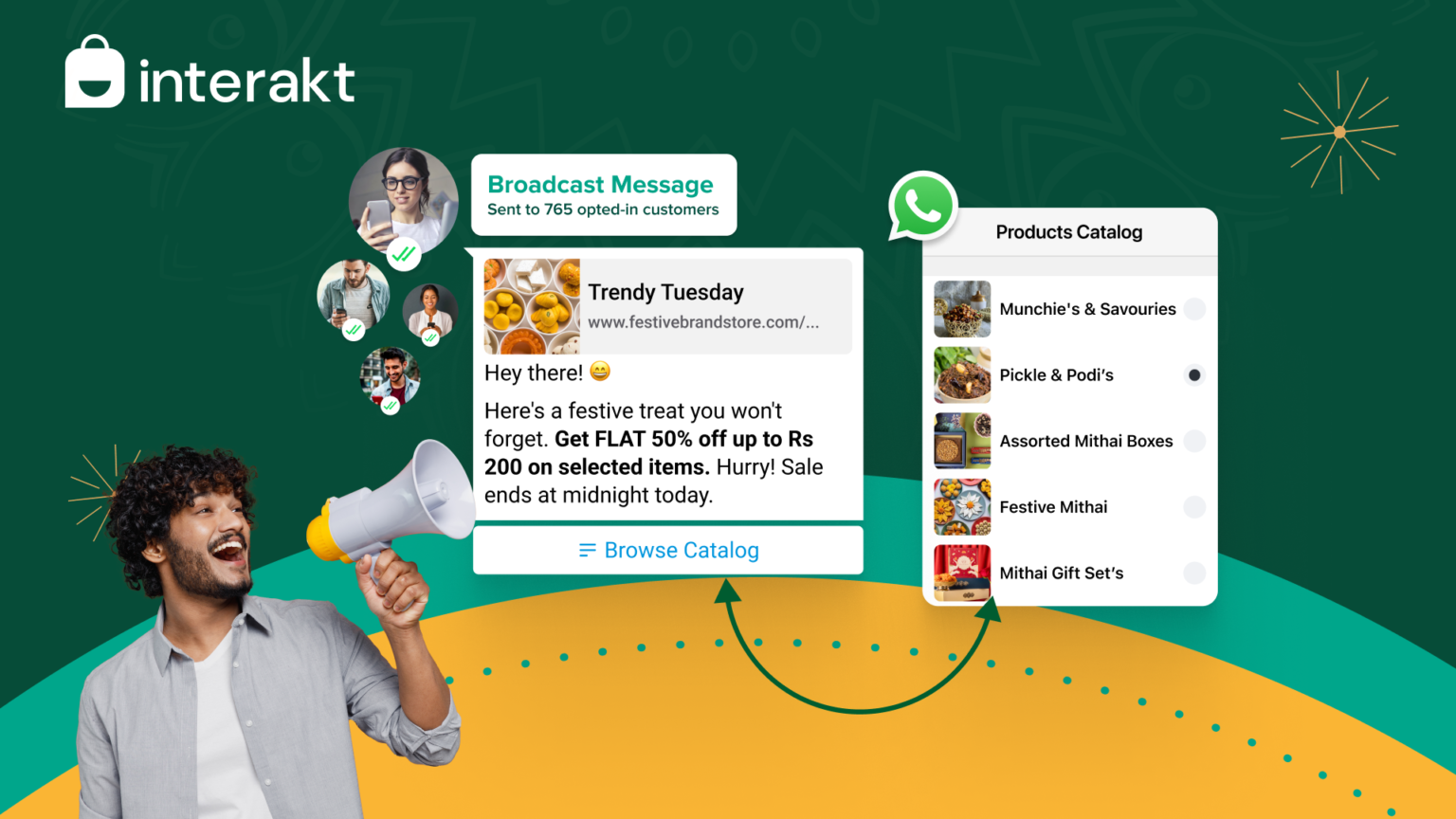
16. WhatsApp retargeting campaigns
You can run WhatsApp retargeting campaigns that allow you to retarget a segment of users through WhatsApp broadcast messaging, based on several scenarios. For example, you can retarget customers who have already shown a small interest in your product to further nudge them into action, or even send messages to customers who haven’t read your broadcast message yet, to pique their interest.
6 WhatsApp Marketing Practices To Follow
Here are some WhatsApp marketing best practices we recommend following:
1. Define your target audience
Before you start your best WhatsApp marketing campaigns, clearly define who your target audience is. This helps you better tailor your efforts to stay relevant to customers and effectively engage them.
2. Ask for opt-in
Have clear opt-in mechanisms in place to let customers provide consent and opt in to receiving your WhatsApp marketing messages. These can be WhatsApp opt-in forms, click-to-WhatsApp ads, or WhatsApp buttons through which customers can initiate a conversation with your business.
3. Provide value
Your marketing messages should provide and accurately convey value to customers to be effective. Value can be shown in clearly worded messages and numbers, making it more appealing and worthwhile to customers.
4. Personalize messages
Use customer names and past interactions to personalize WhatsApp marketing messages. This helps you connect with customers more meaningfully through your WhatsApp marketing efforts.
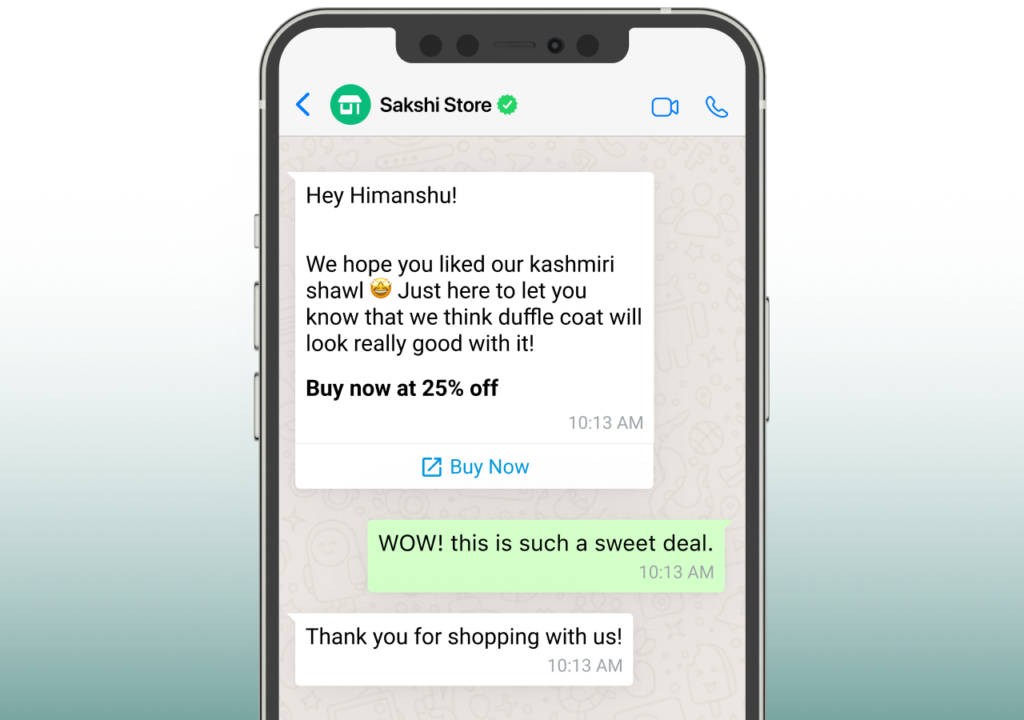
5. Use rich visuals
Enhance your WhatsApp marketing messages by incorporating rich media content like videos, images, GIFs, and PDF documents. This not only improves the quality of the messages but also provides a more engaging communication experience.
6. Measure and optimize
Finally, it is important to measure the performance of your WhatsApp marketing campaigns constantly. This allows you to identify areas for improvement and optimize the WhatsApp campaign ideas for the best outcome.
WhatsApp marketing ideas for retail
In the retail industry, WhatsApp marketing services can be used in the following ways:
• Product launch announcements: Share WhatsApp messages to customers alerting them about your latest product being launched.
• Flash sales and limited-time offers: Notify customers of limited-time offers and flash sales to create FOMO.

• Loyalty program updates: Share loyalty program updates such as updated loyalty point count, special loyalty offers etc. to customers.
• Abandoned cart reminders: Notify customers with abandoned carts to get back to their cart, while offering incentives for returning and completing purchases.
• Order updates: Share order and delivery updates regularly with customers to put them at ease regarding the status of their orders.
• Seasonal promotions: Use seasonal promotional campaigns such as summer sales and Christmas campaigns to get the most out of the seasonal spirit.
• Referral programs: Run referral programs on WhatsApp to organically get more leads and customers.
WhatsApp marketing ideas for healthcare
Here are a few WhatsApp marketing ideas for the healthcare industry:
• Appointment reminders and scheduling: You can share WhatsApp messages alerting customers on upcoming checkups or appointments. WhatsApp can also be used for scheduling appointments easily.
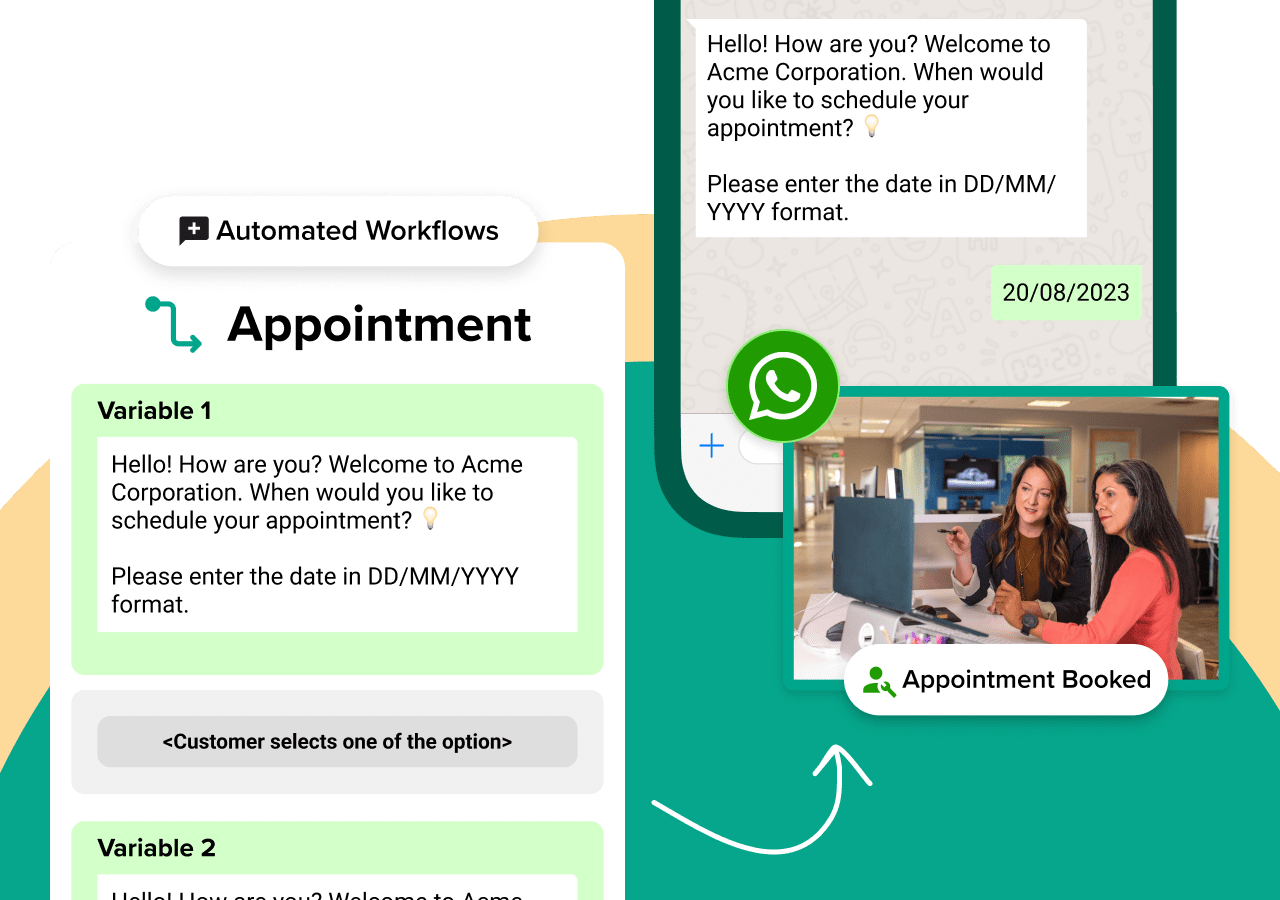
• Virtual consultations and telehealth services: Customers can use WhatsApp to reach out and consult with healthcare professionals.
WhatsApp marketing ideas for BFSI
In the banking, financial services and insurance industries, WhatsApp can be used for:
• Loan and mortgage application updates: Update customers on the status of their loan and mortgage application through WhatsApp.
• Account balance and transaction alerts: Alert customers on their recent transactions as well as the account balance on WhatsApp.
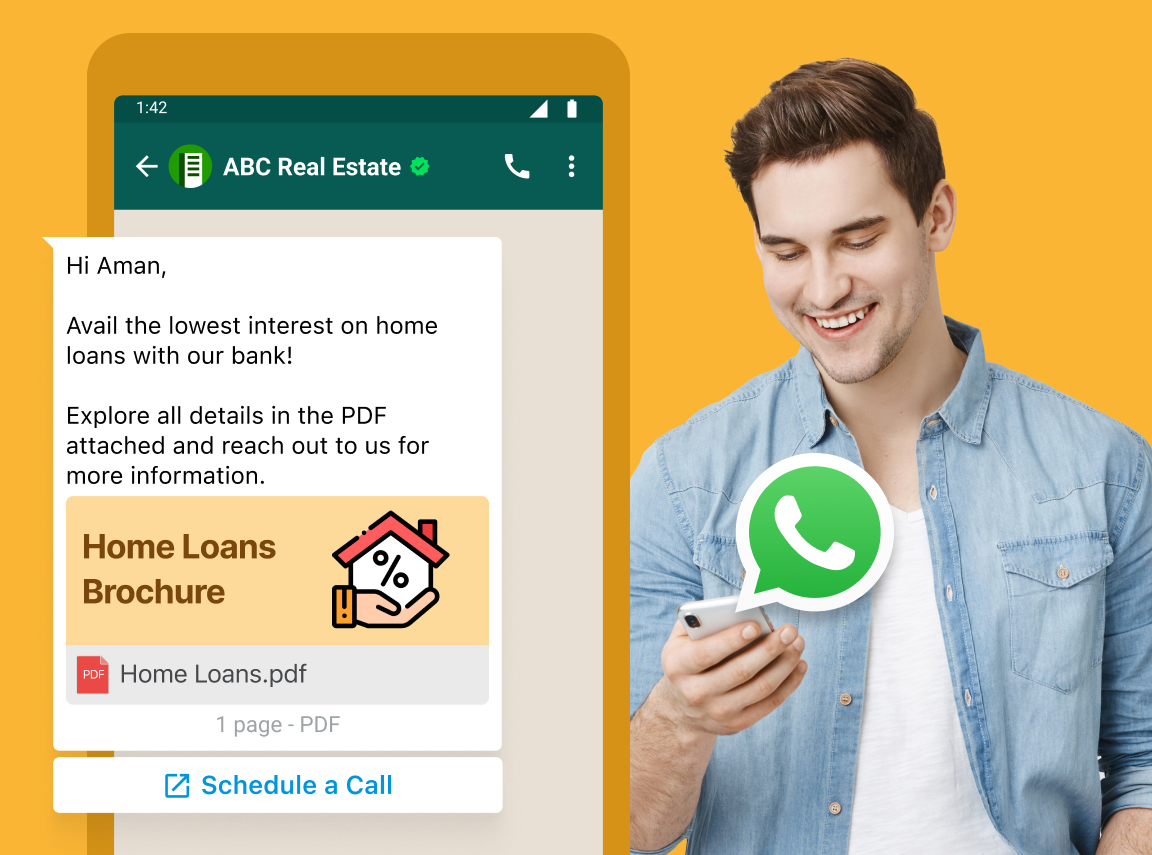
• Credit card usage and reward updates: Use WhatsApp to update customers on credit card usage as well as special rewards.
• Loan pre-approval notifications: Notify customers about loan pre-approval with a timely WhatsApp message.
WhatsApp marketing ideas for travel
For businesses in the travel industry, WhatsApp marketing can be used for:
• Exclusive travel deals and discounts: Businesses can provide special discounts and deals on flights, trains and buses, exclusive to their customers, through WhatsApp.
• Booking confirmation and updates: WhatsApp can be used to confirm bookings and to share regular updates to customers on the timings and their itinerary.
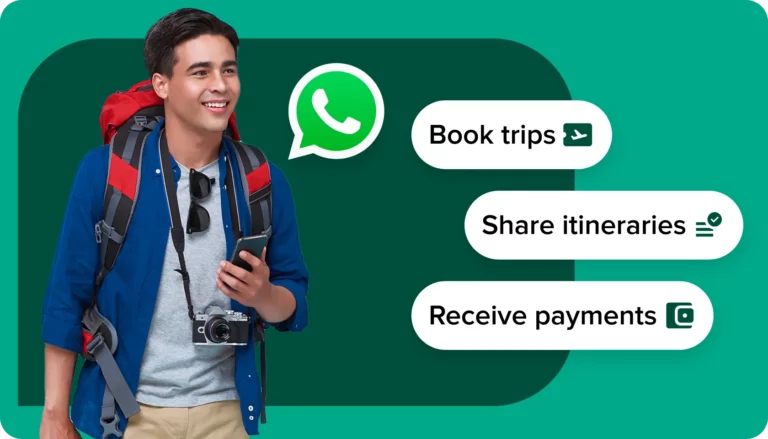
• Last-minute travel offers: Customers can be offered last-minute discounts which can effectively nudge them to book and confirm.
• Visa and documentation assistance: Customers can be provided with hands-on assistance regarding visas and documentation through WhatsApp.
WhatsApp marketing ideas for food and restaurant
Businesses in the food and restaurant industry can use WhatsApp for:
• Food order and delivery notifications: Share live updates on food orders, location and status of the orders, and delivery confirmation to eliminate customer anxiety.

• Birthday and anniversary offers: Provide special birthday or anniversary offers, letting customers celebrate at discounted prices.
Steps To Get Started With WhatsApp Marketing
To start your journey with WhatsApp marketing follow these simple steps:
Step 1: Start by learning the opt-in rules.
To comply with WhatsApp marketing regulations, brands can only send messages if customers opt-in or initiate contact.
Opt-in forms must include the brand’s logo, WhatsApp name, message details, and a phone number field.
Brands must specify the types of information they’ll send and get consent for additional messages.
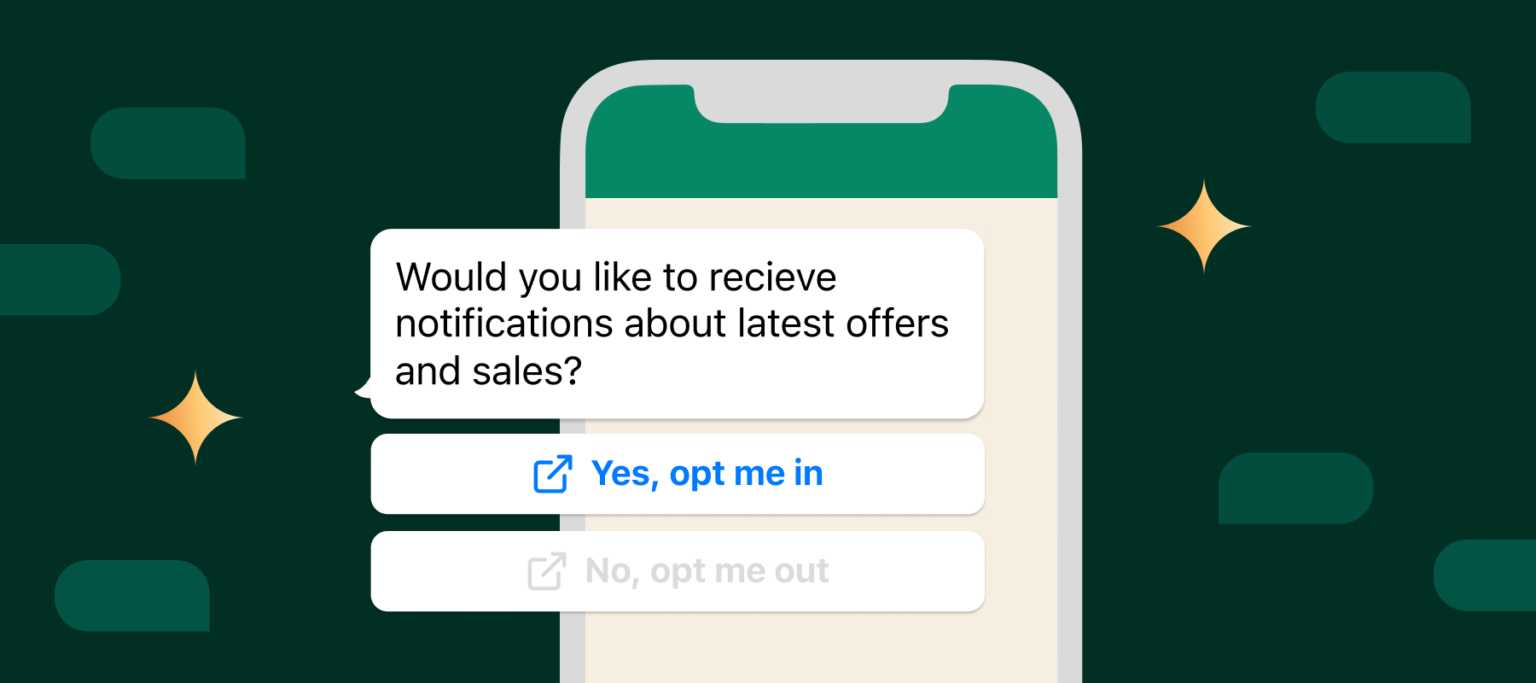
Step 2: Download the WhatsApp Business app and set up your WhatsApp Business profile.
Here you need to provide everything from the brand name to the logo, to the description, contact information etc. It will also include your business open hours, category and location.
Step 3: Promote your WhatsApp Business profile.
You can do this by adding a WhatsApp widget to your website, sharing your WhatsApp link on social media, and using Click-to-WhatsApp ads to drive conversations and opt-ins during WhatsApp campaigns.
Step 4: To optimize everyday tasks and provide fast support, set up WhatsApp automation and quick replies.
You can enable Quick replies by navigating to “More Options” > “Business tools” > “Quick replies”, and then create messages and shortcuts for faster responses.
Note that you can add up to 50 quick replies, with each shortcut being up to 25 characters.
Additionally, with WhatsApp Business API platforms like Interakt, you can also create custom automation workflows that can handle tasks like sending welcome messages, order updates, feedback requests, reminders etc., thus reducing your team’s workload while keeping your audience engaged.
Step 5: Organize contacts using the label feature.
This feature helps you segment your customers and allows your team to prioritize and manage interactions more efficiently.
With Interakt’s Shared Team Inbox, these labels can be used to assign and track customer interactions, which will ensure organized and context-driven responses.
Step 6: Now you can create a product catalog for your products. You can create product catalogs on WhatsApp with up to 500 items, and display their product cost, descriptions, and images.
This enables customers to easily view products, add them to their cart, and send the cart to your business to complete the purchase. This also eliminates the need for external websites and makes it easier to showcase and advertise your products directly on WhatsApp.
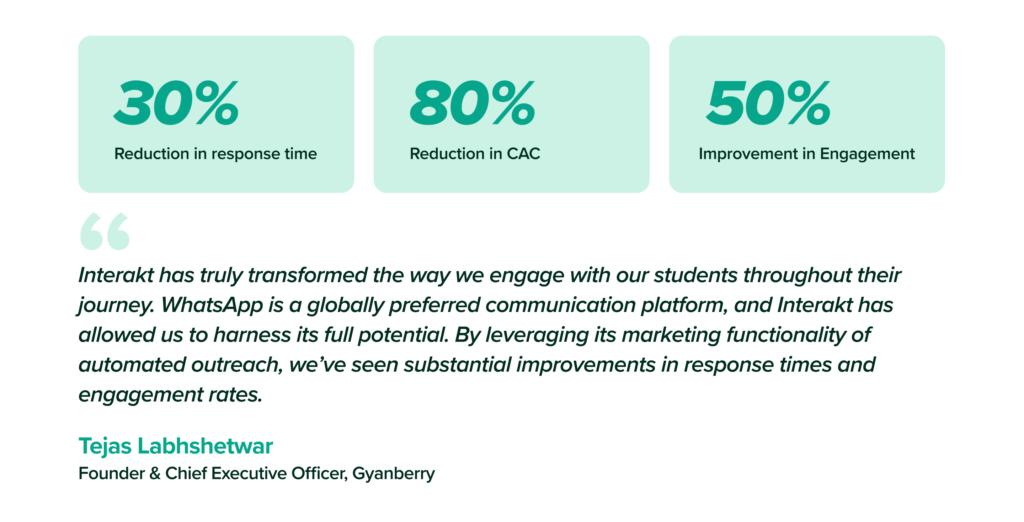
Top WhatsApp marketing metrics to track in 2025
Tracking key WhatsApp marketing metrics is essential for improving your efforts. Interakt offers detailed WhatsApp analytics to help you stay on top of your campaign performance. Here are the most important metrics to track:
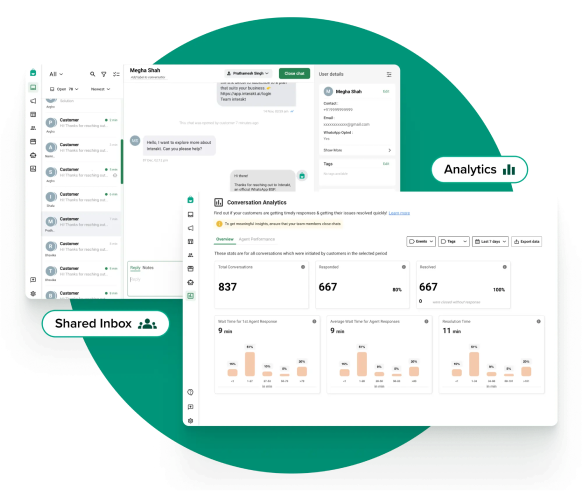
Delivery rate
The delivery rate is the percentage of messages you send successfully delivered to the recipient.
Open rate
Open rate is the percentage of delivered messages that recipients open, indicating initial engagement.
Response rate
The response rate indicates the percentage of opened messages that recipients have responded to. This shows active engagement from the recipients’ side.
Click-through rate
Click-through rate is the percentage of recipients who click on a link within the message, reflecting interest in the content.
Engagement rate
The engagement rate is the overall percentage of recipients who, in this case, have interacted with your WhatsApp message, by way of clicking, replying or taking other actions.
Conversion rate
Conversion rate is the percentage of recipients or customers who complete a specific desired action, such as making a purchase or signing up, after engaging with the message.
Opt-out rate
The opt-out rate indicates the percentage of customers or recipients that choose to unsubscribe or opt out of receiving WhatsApp messages from your business.
Average response time
The average response time is the average amount of time it takes for your team to respond to customer messages and inquiries.
Cost per conversion
Cost per conversion is a metric that indicates the average cost incurred for achieving a single conversion. It is calculated by dividing the total marketing cost by the number of conversions.
CSAT
CSAT or customer satisfaction score is a metric that measures customer satisfaction based on customer ratings of their experience with your brand’s products or services.
NPS
NPS or Net Promoter Score gauges customer loyalty based on how likely customers are to recommend your business to others. This way, customers can be seen as detractors or promoters for your brand.
To learn more about the importance of tracking WhatsApp chat metrics and gain an in-depth understanding, read this blog.
Conclusion
WhatsApp marketing should not be viewed merely as an alternative to other marketing platforms like email or SMS, but rather as a highly impactful and beneficial marketing method. With its unique features, added benefits, and flexibility to meet the marketing needs of businesses across industries, using WhatsApp for marketing is a practical choice.
Thinking of reaching customers on a more personal level through WhatsApp?
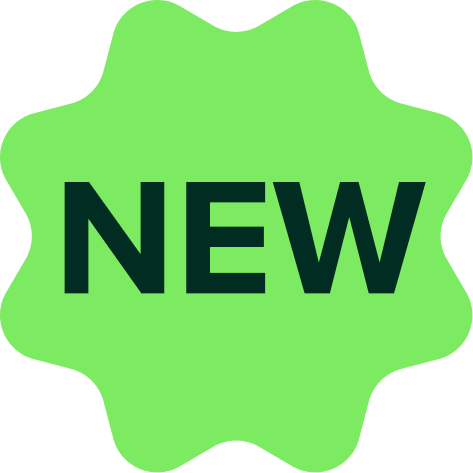 WhatsApp Sales CRM – Track Leads & Close Deals Faster! [Try It Now]
WhatsApp Sales CRM – Track Leads & Close Deals Faster! [Try It Now]